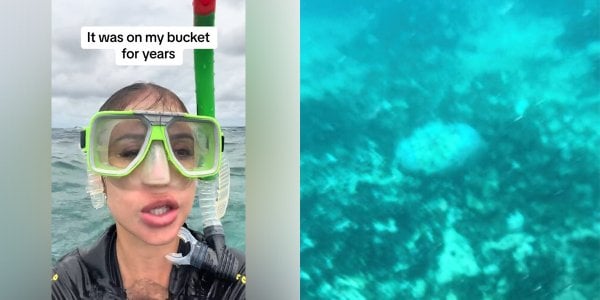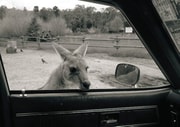Disappointed tourist shares Great Barrier Reef experience: ‘It’s certainly not what you’d expect’
- Replies 4
The Great Barrier Reef, a UNESCO World Heritage site and one of the Seven Natural Wonders of the World, has long been a bucket list destination for travellers worldwide.
Stretching over 2,300 kilometres along Australia's northeast coast, it is the world's largest coral reef system home to a diverse marine life, including over 1,500 species of fish, about 400 species of coral, 4,000 species of mollusc, and some 240 species of birds.
However, this tourist's experience was far from the vibrant picture.
An Australian woman, eager to tick off her bucket list item of visiting the Great Barrier Reef, was left feeling 'underwhelmed' and 'devastated' after her recent visit.
She took to social media to share her disappointment, stating, 'This is the most underwhelming thing.'
'There's no colour, there's no fish, it all looks dead. It is certainly not what you'd expect from the Great Barrier Reef,' she lamented.
She also noted an abundance of 'white stuff floating around everywhere', obstructing her view and contrasting starkly with the colourful reefs usually associated with the Great Barrier Reef.

The only time she saw a fish, she said, was at the end of her tour when she fed them from her boat.
'To say I was [devastated] and underwhelmed is an understatement. I knew through global warming and too many of us tourists, that we had done some damage,' she said.
'But I had heard and hoped we were regenerating it. This proved to me we have a long way to go.'
According to the Great Barrier Reef Foundation, coral bleaching occurs when corals, stressed by changes in conditions such as temperature, light, or nutrients, expel the symbiotic algae living in their tissues, causing them to turn completely white.
While bleached corals are not dead, they are under more stress and are subject to mortality.
The first recorded mass bleaching event at the Great Barrier Reef occurred in 1998, followed by events in 2002, 2016, 2017, 2020, and 2022.
Richard Leck, WWF-Australia's Head of Oceans, stated in 2023 that these events, likely fuelled by climate change, now seem to occur 'more than once every two years.'
'Coral bleaching is directly attributable to climate change caused by rising global emissions,' he said.
'Reducing Australia’s domestic and exported emissions fast, this decade, is the main solution within our control.'
The condition of the Great Barrier Reef is much more complex than what we see in the headlines. To understand more about its state, check out this story as experts from the Australian Institute of Marine Science provide an update on what’s really happening on the reef.
As travellers, we can also play our part by practising responsible tourism, including not touching or standing on corals, disposing of waste properly, and choosing eco-friendly tour operators.
The Great Barrier Reef is a global treasure that Australia cannot afford to lose.
It's a stark reminder of the urgent need to address climate change and protect our planet's precious biodiversity.

What are your thoughts on this issue, dear readers? Have you visited the Great Barrier Reef recently? Share your experiences and thoughts in the comments below.
Stretching over 2,300 kilometres along Australia's northeast coast, it is the world's largest coral reef system home to a diverse marine life, including over 1,500 species of fish, about 400 species of coral, 4,000 species of mollusc, and some 240 species of birds.
However, this tourist's experience was far from the vibrant picture.
An Australian woman, eager to tick off her bucket list item of visiting the Great Barrier Reef, was left feeling 'underwhelmed' and 'devastated' after her recent visit.
She took to social media to share her disappointment, stating, 'This is the most underwhelming thing.'
'There's no colour, there's no fish, it all looks dead. It is certainly not what you'd expect from the Great Barrier Reef,' she lamented.
She also noted an abundance of 'white stuff floating around everywhere', obstructing her view and contrasting starkly with the colourful reefs usually associated with the Great Barrier Reef.

This tourist was left disappointed after finding white stuff instead of fish while snorkelling in the Great Barrier Reef. Credits: Tiktok / Adriana Zero (AJE)
The only time she saw a fish, she said, was at the end of her tour when she fed them from her boat.
'To say I was [devastated] and underwhelmed is an understatement. I knew through global warming and too many of us tourists, that we had done some damage,' she said.
'But I had heard and hoped we were regenerating it. This proved to me we have a long way to go.'
According to the Great Barrier Reef Foundation, coral bleaching occurs when corals, stressed by changes in conditions such as temperature, light, or nutrients, expel the symbiotic algae living in their tissues, causing them to turn completely white.
While bleached corals are not dead, they are under more stress and are subject to mortality.
The first recorded mass bleaching event at the Great Barrier Reef occurred in 1998, followed by events in 2002, 2016, 2017, 2020, and 2022.
Richard Leck, WWF-Australia's Head of Oceans, stated in 2023 that these events, likely fuelled by climate change, now seem to occur 'more than once every two years.'
'Coral bleaching is directly attributable to climate change caused by rising global emissions,' he said.
'Reducing Australia’s domestic and exported emissions fast, this decade, is the main solution within our control.'
The condition of the Great Barrier Reef is much more complex than what we see in the headlines. To understand more about its state, check out this story as experts from the Australian Institute of Marine Science provide an update on what’s really happening on the reef.
As travellers, we can also play our part by practising responsible tourism, including not touching or standing on corals, disposing of waste properly, and choosing eco-friendly tour operators.
The Great Barrier Reef is a global treasure that Australia cannot afford to lose.
It's a stark reminder of the urgent need to address climate change and protect our planet's precious biodiversity.
Key Takeaways
- An Australian woman was left feeling underwhelmed after visiting the Great Barrier Reef, finding it bleached and devoid of vibrant marine life.
- Climate change and global warming have been blamed for the decline in the reef's health, with warmer waters and extreme weather events contributing to coral bleaching.
- Despite the reef's biodiverse ecosystem, the tourist noticed a lack of colourful corals and fish during her dive, sharing her disappointment on social media.
- There have been several significant coral bleaching events attributed to climate change, and reducing emissions is seen as a critical step in protecting the Great Barrier Reef.
What are your thoughts on this issue, dear readers? Have you visited the Great Barrier Reef recently? Share your experiences and thoughts in the comments below.







